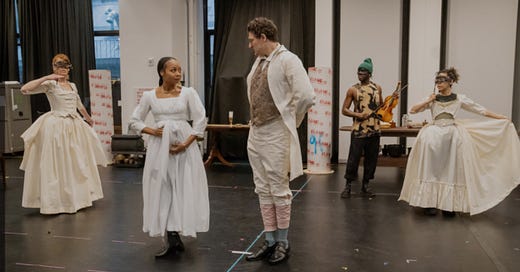Theater: “Sally & Tom” at the Public
The relationship between Thomas Jefferson and Sally Hemmings has intrigued scholars and the rest of us for years. First question: Did it really happen? (Evidence suggests it did.) Is it weird for a slave to love her master? (Slightly.)
If anybody could look at the matter and fashion it into an entertaining evening, it would be none other than Suzan-Lori Parks which she has done in her very good and often brilliant new play “Sally & Tom,” previewing at the Public.
The format is a play-within-a-play, and the characters of that inner play are the actors in The Good Company, a striving little theater company in an unnamed city. Both Mike the director (Gabriel Ebert) and Luce the playwright (Sheria Irving) are still working out the details, meanwhile doubling as Jefferson and Hemmings. The company is not flush with money, you see, so the actors also serve as the lighting director, makeup artist and costume designer.
The play-within-a-play, called “The Pursuit of Happiness.” gets the historical facts right: the romance between Jefferson (41) and Hemmings (a mere 14) that began in Paris circa 1789. We are also introduced to Tom’s privileged daughters Patsy (Kate Nowlin) and Polly (Sun Mee Chomet) as well as Sallie’s handsome and proud brother James (Alano Miller).
This equilibrium is interrupted by the announcement that Tom will be heading to New York, then the nation’s capital, to serve as Secretary of State. This worries Jefferson’s 600 slaves as those who do not accompany him will be sold or “leased out” to other slave holders.
As for the play outside the play, there’s plenty going on here too: the real-life tempestuous romance between Mike and Luce; the costume lady who wants to act; and the hookup between the two gay guys, for starters. Above all, there is the need for bending to the whims of producers, who demand the fiery speech Luce has written for James be deleted from the final play.
So where does the “often brilliant” part come in? Toward the end of Act One, when Tom breaks the fourth wall and addresses the audience, delivering a soliloquy revealing how hypocritical he is. Then, toward the end of Act Two, Sally soliliquys on the ambiguity of her relationship with Tom.
Yes, Thomas Jefferson played the violin, spoke three languages, and invented the revolving chair with a leg rest and writing arm. But he also owned slaves whom he did not free at his death and had an affair that was kept secret for decades. Thanks to Parks who delivers this unkind truth in a very original way. Caution, however: You may never look at photos of Monticello the same way again.
Like this review? Follow me at “What Does Aug Think?” at acsntn.substack.com. Thank you!



